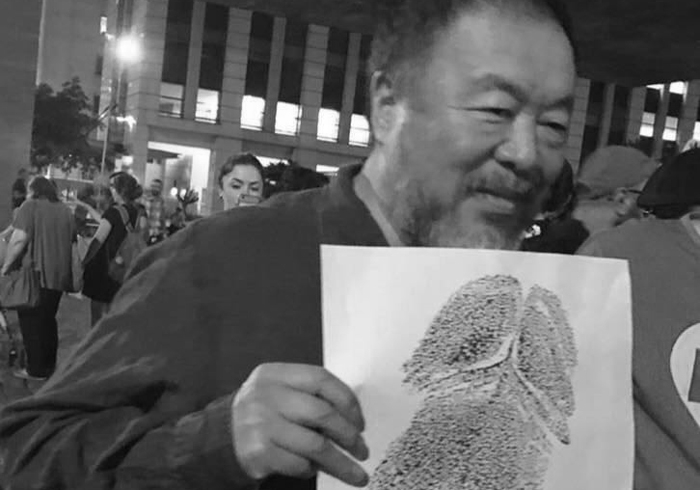Coinciding with the opening of the exhibition Histórias da Sexualidade (Histories of Sexuality) on Thursday evening, demonstrators picketed the Museu de Arte de São Paulo (MASP). The rally was organised to protest a series of attacks on Brazilian arts institutions by right-wing activists and the decision by MASP to ban under-18s from attending its new show.
The protest came less than a month after the controversy surrounding the Museum of Modern Art (MAM), when a child briefly touched the foot of a naked man during a performance by artist Wagner Schwartz, and the decision of Porto Alegre’s Santander Cultural art centre to close Queermuseum, an exhibition of contemporary queer art. MAM and its employees were targeted by evangelical Christians and members of Movimento Brasil Livre (MBL), a libertarian group who were instrumental in bringing about the impeachment of former president Dilma Roussef. João Doria, the conservative mayor of São Paulo refused to condemn the attacks. Marcelo Crivella, an evangelical Christian and mayor of Rio de Janeiro, said he would move to block a proposed restaging of Queermuseum.
Among the protestors outside the museum was artist Ai Weiwei, in Brazil for the opening of the São Paulo Film Festival. The U2 drummer Larry Mullen Jr. wore a t-shirt declaiming the encroaching censorship during a concert by the Irish band the same night.
An open letter, denouncing the censorship of the arts, has been signed by artists and curators from across Brazil. Among the signatories are Renata Lucas, Lucia Koch, Sergio Sister, Jac Leirner, Rodrigo Moura and Miguel Chaia. The letter is published here in full:
We are artists, intellectuals and professionals from several areas, who have been speaking up in defense of democracy since 2015. Now we side with the recent initiatives against the wave of hate, intolerance and violence against free expression in the arts and in education. Hatred, intolerance and violence which have been pressed for a long time against women, LGBTQs, afro-descendant and indigenous people.
We radically support freedom of speech and free flow of ideas, beliefs, information and artistic expressions. And we firmly believe in the free debate of each of these expressions.
We believe, however, that it is necessary to identify the focus of these attacks on civil liberties. It became evident that right-wing militants, sects from within neo-Pentecostal churches, certain politicians with great public responsibility – but lacking republican spirit –, civil servants and bureaucrats in the judiciary sphere, the police force and public prosecutors are joining forces against artistic creations and art institutions. They are censoring exhibitions, harassing visitors and museum employees, and using social networks to demean and outrage people they disagree with.
These arrogant fundamentalists refuse to give artistic works a more attentive reading, and go witch-hunting for signs of indecency, pornography and heresy. There is no questioning or intellectual debate, only violence and intolerance. That is how the reactionary and anti-democratic militias managed to abruptly shut down the exhibition Queermuseu at Santander Cultural Center in the city of Porto Alegre. In September, the police withdrew the painting Pedofilia, by Alessandra Cunha, from the Contemporary Art Museum in Campo Grande; then a local court of law banned the theatre play The Gospels According to Jesus, Queen of Heaven, by Jo Clifford, at Sesc Jundiai. It is worth mentioning that the same militias have kick started a campaign against the Panorama of Brazilian Art at the Museum of Modern Art in São Paulo due to the performance La Bête, by Wagner Schwartz, an attack given irresponsible support by the mayor of São Paulo João Doria. Then, a horde of fanatics led by congressman João Leite attempted to invade the Palace of Arts in Belo Horizonte aiming to destroy the works by Pedro Moraleida.
We also believe that this is not about a specific assault to the artistic creativity but a phenomenon that emerged in 2010 as opposition to the National Plan for Human Rights (PNDH 3); a process that grew and was nurtured throughout the process of deposition of elected president Dilma Rousseff.
Clearly, not every supporter of the presidential impeachment belong to this antidemocratic lineage. But there were violent ultraconservative activists and public agents harassing people of diverse thinking. The same people that were responsible for the several actions, such as the distribution of anti-Dilma sexist, misogynist and offensive car stickers; the verbal assault to left wing politicians and activists on airplanes, in restaurants and even at more sensitive places like funerals and hospital wings; and the physical assaults to people wearing red clothes.
Once the impeachment was completed – in better words, a parliamentary coup arranged through the buying of congressman votes led by Eduardo Cunha – a number of social achievements that have been obtained since the 1988 Constitution are being snatched away from the Brazilian people. That is how, day-by-day, they are restraining civil, social and individual rights in Brazil, suppressing worker’s rights, threatening the freedom of education in schools, the environment protection, the same-sex union and much more. That is the body of work that results from this coup d’Etat.
What we need now is to expand all democratic forces, beyond political partisanship, ideological and religious views, to face the concrete threats to freedom and social policies already in place, in the streets, in the legislative houses, in the courts of justice and in all the available means of communication. We propose the articulation of groups among friends, family and work colleagues for the organization of public acts and online action in the social networks aiming to defend and deepen the rights to an environment of free circulation of ideas, and denounce those who work to destroy democracy in Brazil.
20 October 2017
